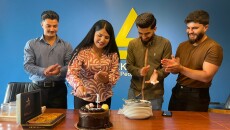"The environmental information was new in general, the steps of producing a story were reviewed starting from the idea pitching until the production of the story and how to edit it," said Sumaia Saleh, one of the participants in the program "Amplifying the role of female journalists in environmental reporting", after the end of the first part of the program last week.
The KirkukNow media outlet implements the program with support and funding from the German Federal Foreign Office. The program lasts for six months and consists of several stages. In general, the program is based on the triangle of constructive journalism, reporting environmental challenges, and amplifying the role of female journalists.
On July 28, the program's first phase was launched which consisted of a five-day training for 17 female journalists from eight Iraqi governorates who participated after submitting their CVs and were shortlisted by a committee of four members.
Saleh, editor-in-chief of the Nawzhin website, who came from Kalar district and had the opportunity to participate in the program, said, "The program is important. Most of what we learned in the first module were new topics, although most of us have been practicing journalism for years, they were new to us. On the other hand, what increases the importance of the program is its connection to the environmental issue, because we as journalists have not paid this issue enough attention."
"In addition to the information related to the environment, the steps of preparing a journalistic piece from the idea to the production stage were new and at the same time important to us." She believes environmental journalism is "really important because our view of the environment differs from the common view the media has been working on for years."
Baran Mohammed, who came from Erbil to participate in the program, says that the program is important to enable journalists to deal with environmental issues and, in turn, raise awareness of the public.
"During the program, we got an insight into the environmental problems each governorate suffers from according to the participants. This information was new to me and I became aware of the environmental problems in different regions. The feature style of presenting environmental topics was also new to me," Baran said
"Women are an integral part of society and play a role in raising future generations. Women are more in contact with environmental problems which have direct impact on them, so having this awareness among women is necessary,” she added. “It is also very important for women to become part of the environmental solutions and to deal properly with it."
Salam Omar, the international trainer of journalism and chief media adviser of KirkukNow, said, "The first five days of training covered several topics, including news and information, how to produce a news story, and the principles of professional journalistic work. We also covered the media environment in Iraq, climate change, and its impact on women."
Another part of the program dealt with how to produce a news story and a journalistic topic (figure) as two main patterns for covering environmental issues.
"Another important topic is how journalistic material should be balanced in portraying women in the media. In this regard, some practical steps were reviewed," Omar added.
He pointed out that "by the end of the training, a common understanding will gradually emerge about why traditional journalism is in crisis and why the recipient is avoiding news."
The second module of the program includes five days of training from August 11 to 15, covering environmental issues based on constructive and solution journalism.
In the end, the participants produce four materials based on constructive journalism. By the end of the program, it is planned to announce the establishment of the "First Network of Female Journalists for Environmental Coverage Based on Constructive Journalism."
Participants in the "Expanding the Role of Female Journalists in Covering Environmental Issues" program. Photo: KirkukNow
Lava Hisam, a graduate of the media department at the Technical Institute in Sulaymaniyah and one of the participants in the program, said, “Before, as a normal person, I was just trying not to be part of polluting the environment, but now I feel that I should have a role in raising awareness and urging people to preserve the environment.”
“Women can be an effective force in raising environmental issues since they are more affected by environmental changes.”
Awat Omar, a participant from Kirkuk, said, “Meeting a new group interested in preserving the environment is important to me. We can cooperate to work on the environmental issue.”
The program was designed in a way participants practically apply what they learned theoretically. Shorsh Khalid, the editor-in-chief of KirkukNow, said, “In the first five days of the training program, the participants produced 12 journalistic articles based on the principles they learned, 10 of which were related to the issue of the environment and climate change. Every day, the participants were assigned to do homework... The journalistic articles were translated into Arabic and English on the same day.”
“We created a special newsroom for the program to produce environmental materials using the news story format. We used to discuss and enrich the participants’ ideas and then produce the materials in cooperation with the trainers,” Shorsh explained.
At the end of the first module, each participant proposed one idea for producing a feature piece in preparation for its production in the week preceding the start of the second module, which will focus on constructive and solution journalism.
Saleh suggested that KirkukNow organize reporting courses like academic institutes to transfer their expertise.
“KirkukNow has a professional team with great experience and needs to transfer its expertise to beginner reporters to develop their skills, especially in writing breaking news stories, news reports and features.”





